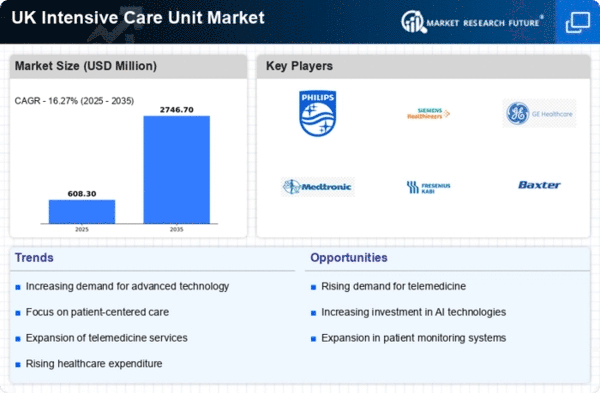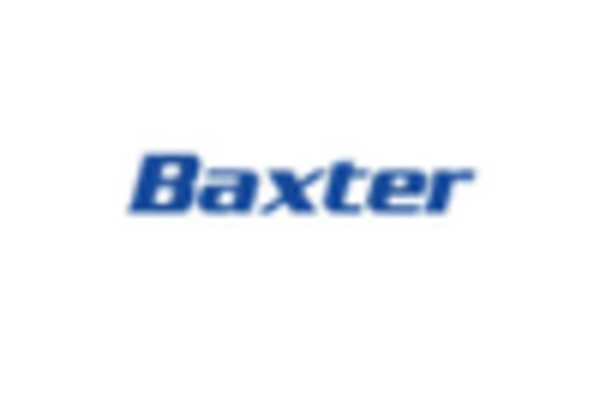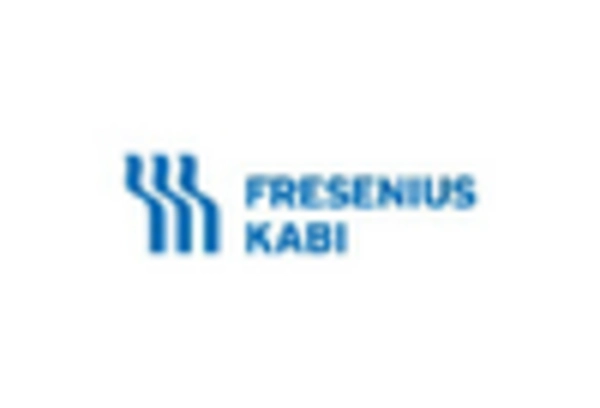Government Initiatives and Funding
Government initiatives aimed at improving healthcare infrastructure are significantly impacting the Intensive Care Unit Market. The UK government has committed substantial funding to enhance healthcare services, particularly in critical care. Recent budgets indicate an allocation of over £1 billion to upgrade hospital facilities, including intensive care units. This funding is intended to improve patient outcomes and increase the capacity of existing units. Additionally, initiatives such as the NHS Long Term Plan emphasize the importance of critical care services, which may lead to further investments in the intensive care-unit market. These government efforts are likely to foster innovation and improve the quality of care provided in intensive care settings, ultimately benefiting patients and healthcare providers alike.
Focus on Staff Training and Development
The Intensive Care Unit Market is experiencing a heightened focus on staff training and development. As the complexity of patient care increases, the need for highly skilled healthcare professionals becomes paramount. Recent surveys indicate that over 70% of intensive care unit managers in the UK believe that ongoing education and training are essential for improving patient care. This emphasis on professional development is likely to lead to enhanced clinical skills and better patient outcomes. Furthermore, healthcare organizations are investing in simulation-based training programs to prepare staff for high-pressure situations commonly encountered in intensive care settings. This trend suggests that a well-trained workforce is crucial for the success of the intensive care-unit market, as it directly correlates with the quality of care provided to patients.
Growing Emphasis on Patient-Centric Care
The shift towards patient-centric care is significantly influencing the Intensive Care Unit Market. Healthcare providers are increasingly recognizing the importance of involving patients and their families in care decisions. This approach not only enhances patient satisfaction but also improves clinical outcomes. Recent studies indicate that patient engagement can lead to a 20% reduction in hospital readmissions. In the UK, initiatives aimed at fostering communication between healthcare teams and patients are gaining traction, reflecting a broader trend towards personalized care. This emphasis on patient-centric practices is likely to drive changes in the intensive care-unit market, as facilities adapt to meet the evolving expectations of patients and their families.
Rising Demand for Critical Care Services
The increasing prevalence of chronic illnesses and acute medical conditions in the UK is driving the demand for critical care services. As the population ages, the need for Intensive Care Unit Market facilities is expected to rise. According to recent data, approximately 18% of the UK population is over 65 years old, a demographic that typically requires more intensive medical attention. This trend suggests that healthcare providers must expand their intensive care capabilities to accommodate the growing number of patients requiring specialized care. Furthermore, the NHS has reported a steady increase in admissions to intensive care units, indicating a pressing need for enhanced resources and infrastructure within the intensive care-unit market. This rising demand is likely to stimulate investments in advanced medical technologies and skilled personnel, thereby shaping the future landscape of the intensive care-unit market in the UK.
Integration of Advanced Monitoring Systems
The integration of advanced monitoring systems is transforming the Intensive Care Unit Market. These systems enhance patient safety and improve clinical outcomes by providing real-time data on vital signs and other critical parameters. The adoption of technologies such as telemedicine and remote monitoring is becoming increasingly prevalent in the UK, allowing healthcare professionals to monitor patients more effectively. Reports suggest that hospitals implementing these systems have seen a reduction in adverse events by up to 30%. This trend indicates a shift towards more data-driven approaches in the intensive care-unit market, where timely interventions can significantly impact patient recovery. As technology continues to evolve, the demand for sophisticated monitoring solutions is expected to grow, further shaping the landscape of the intensive care-unit market.
















